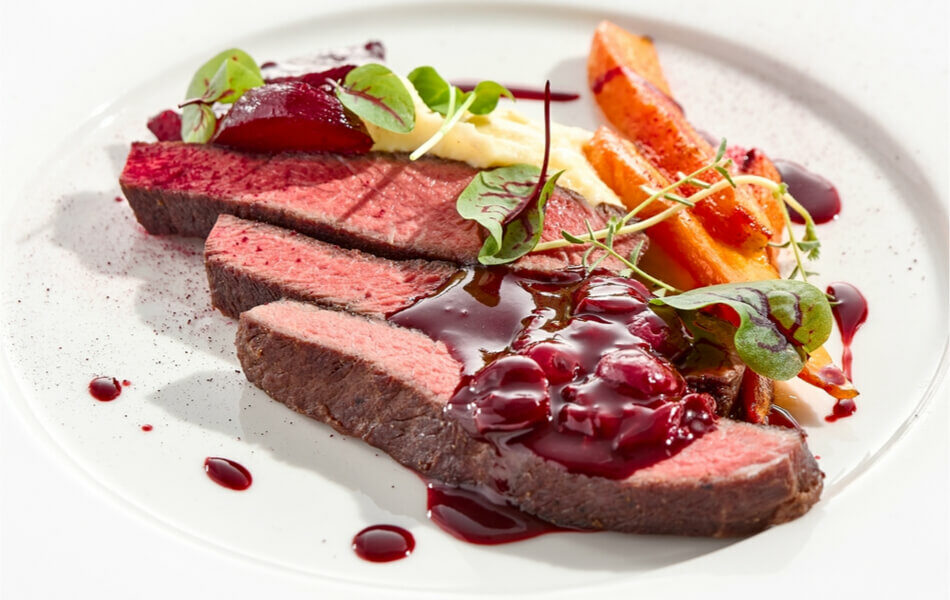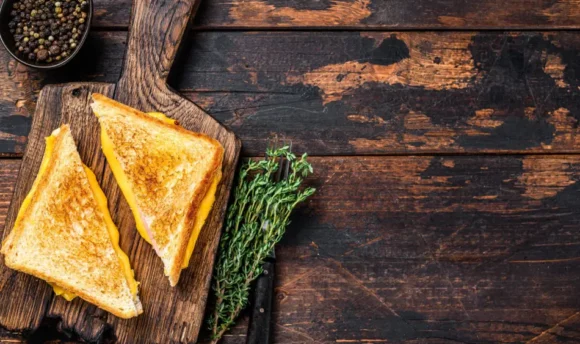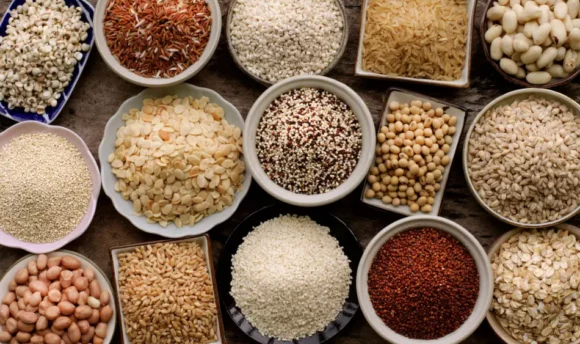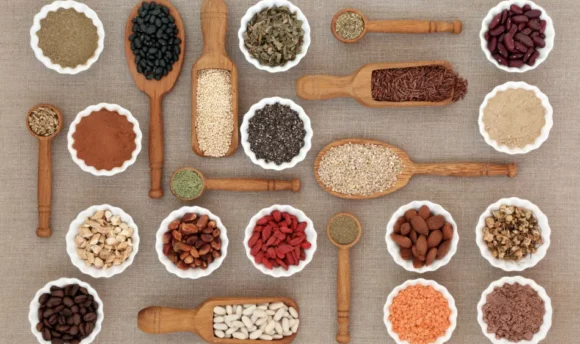Is Venison Healthy? Nutrition and Calories

Venison, or deer meat, is a lean protein source that may just be the perfect healthy addition to your diet. However, there are many drawbacks to consider as well.
Have you ever wondered about the health benefits of eating venison but worried about how to avoid the potential risks?
When prepared and consumed correctly, venison can be a healthy protein source, with fewer calories and fewer grams of fat.
Venison is a nutrient-dense protein option that is hearty and gamey. It has fewer calories and fat, including saturated fat, but is exceptionally rich in protein.
However, improperly sourcing and cooking venison can potentially cause unwanted side effects.
Read on to learn about venison’s nutritional benefits and how to eat it safely.
Is Venison Meat Healthy?
Venison, made from deer, is healthy. Meat is packed with protein and very low in calories and fat, with less saturated fat, compared to other sources of red meat.
In addition, it has beneficial vitamins and minerals, including iron, B vitamins, and zinc.
However, when preparing venison, it is essential to take certain precautions to avoid risks, including lead poisoning, deer tuberculosis, and chronic wasting disease.
We will come back to the possible side effects later!
What Are the Benefits of Deer Meat?
Venison is nutrient-dense meat packed with protein, vitamins, and minerals. Let’s discuss some of the key players.
#1 Supports red blood cell functioning
Venison is classified as red meat, though much lower in grams of fat and calories and higher in protein than other red meats, such as beef or pork.
Additionally, venison is very high in iron, an essential mineral.
Iron is needed to keep your blood healthy by helping red blood cells carry oxygen to cells all around the body. But, most importantly, it carries oxygen to the muscle tissues that use oxygen to function.
According to the Harvard School of Public Health, iron is the most commonly deficient nutrition globally, often leading to iron-deficiency anemia.
There are two versions of iron – heme and nonheme iron. Heme iron comes from animal sources, such as venison, chicken breast, or other red meats, while nonheme iron is typically present in plant sources, such as leafy greens or beans.
Heme iron is the preferred type of iron as it is more bioavailable. Bioavailability means how easily the body can break it down and use it.
Therefore, heme iron is more easily used by the body.
The Recommended Dietary Allowance (RDA), according to the National Institutes of Health (NIH), is 8mg for men, 18mg for women aged 19 to 50, and 8mg for women 51 years and older.
A 100g serving of venison has 3mg of iron.
#2 Full of B vitamins
Similar to other red meats, venison is rich in B vitamins. It is exceptionally high in vitamin B3 (niacin) and vitamin B12 (cobalamin).
Vitamin B3, or niacin, is involved in the energy metabolism in which sugars from food are broken down into energy the body can use.
Vitamin B12, or cobalamin, works in the body to formulate red blood cells, create DNA, and support functions of the nervous system.
#3 Promotes a healthy immune system
Zinc is an essential mineral present in venison that works to support a strong and healthy immune system.
According to the National Institutes of Health, zinc also plays a role in cell metabolism, protein production, wound healing, and more!
Zinc is most abundant in oysters and red meats, and poultry in lesser amounts.
It can also be in fortified foods, meaning the zinc is added during processing and does not naturally occur in the food, such as breakfast cereal.
What Are the Possible Risks of Consuming Venison?
While venison has many health benefits, it also comes with some risks. Let’s talk about these risks and the steps you can take to mitigate them.
#1 Chronic wasting disease
According to the Centers for Disease Control and Prevention (CDC), chronic wasting disease is an infection that has been found in deer, among other animals, in North America, Norway, and South Korea.
The animal experiences significant weight loss, stumbling, and more. It is fatal to the infected animal, and there is no way to treat it.
While chronic wasting disease in deer has not spread to humans, the method of transmission would be through consuming infected venison.
Commercially farmed deer and elk are managed by the United State Department of Agriculture’s (USDA) Animal and Plant Health Inspection Service, certifying that commercial herds are free of chronic wasting disease.
#2 Bovine tuberculosis
Though very unlikely, bovine tuberculosis is a concern when consuming deer meat. However, according to the University of Pennsylvania, the United States has implemented many eradication measures against bovine tuberculosis.
It is essential to cook venison to appropriate temperatures before eating. More on this later!
#3 Risk of lead
Unfortunately, a danger unique to venison is that the deer or elk are traditionally killed with guns. This opens the door to lead from the bullets getting into the meat.
While the large pieces of lead are removed, tiny bits of lead can potentially remain in the meat. Therefore, consuming lead is extremely dangerous and has disastrous effects on the body.
However, the Illinois Department of Public Health states very little evidence exists that lead exposure at this small level is significant enough to cause adverse health effects.
How Do You Prepare Venison?
Since the color and texture of venison is not a clear indication of whether it is fully cooked, it is crucial to use a food thermometer to ensure the meat reaches the appropriate temperature.
According to the University of Minnesota, the following are appropriate minimum temperatures for cooking venison meat:
Whole cuts (steaks and roasts): 145ºF
Ground venison: 160ºF
Soups, stews, casseroles, leftovers: 165ºF
Also, ensure you are measuring the temperature in the thickest section of the meat (not applicable for ground venison) as that section cooks the slowest.
The National Center for Home Food Preservation recommends refrigerating or freezing cuts of meat or sausage. If you are field-dressing wild venison, make sure you cool the deer as soon as possible.
Nutrition Facts
Besides the delicious gamey venison flavor, let’s dive into the venison nutrition of this hearty meat.
Nutrition table (per 100g)
| Calories/Nutrient | Amount |
| Calories (kcal) | 125 |
| Net Carbs (g) | 0g |
| Fiber (g) | 0g |
| Sugar (g) | 0g |
| Fats (Total) | 2.68g |
| Protein (g) | 23.2g |
| Cholesterol (mg) | 85mg |
Source: https://fdc.nal.usda.gov/fdc-app.html#/food-details/2191739/nutrients
High in vitamins and minerals
As mentioned previously, venison is rich in iron, B vitamins, zinc, and more!
Venison has a small number of calories per gram of meat but has very high amounts of vitamins and minerals. In other words, venison is a very nutrient-dense food.
Consuming more nutrient-dense foods versus energy-dense foods high in calories and low in vitamins and minerals can lead to a more satisfying diet and even promote weight loss.
High in protein
With over 23g of protein per 100g serving, venison is a lean protein source to add to your healthy diet.
Protein is made up of building blocks called amino acids. These amino acids can be classified as essential or non-essential. Essential amino acids need to be consumed through food, while the body naturally makes non-essential.
Mainly, we think of protein to build strong muscles. This is true, especially for those in stages of growth, such as pregnant women, growing children, or athletes.
Protein plays a crucial role in every body system on a much smaller scale, from the skeletal system to the digestive system and beyond!
Low in fats and calories
Venison is very high in protein and low in total fat and saturated fat. Since fat, including saturated fat, contains over twice as many calories per gram compared to protein, it makes sense that venison is also low in calories.
Venison does not contain any carbohydrates, so it is primarily composed of protein and is very lean in terms of macronutrients.
While this may lead to slightly less flavor and a tougher chew, you can enjoy venison without consuming too much fat and calories.
High in cholesterol
Cholesterol is a waxy substance, similar to fat. Our livers naturally make all the cholesterol we need to survive.
Therefore, eating animal products and red meat, especially animal liver, add unneeded cholesterol into the bloodstream.
Over time, similar to saturated fat, eating excessive cholesterol can build up plaque in the arteries. If the plaque builds up enough to block the artery completely, it could cause a heart attack or a stroke.
While the recommendation used to be approximately 200–300mg of cholesterol a day, the 2020–2025 Dietary Guidelines for Americans now recommend consuming as little cholesterol as possible.
Venison contains 85mg of cholesterol in a 100g serving size.
A Word From a Dietitian
Venison can be a significant part of your healthy diet, full of excellent nutrients, vitamins, and minerals. First, however, it is vital to take steps toward ensuring your venison is safe to eat.
To avoid the risks, ensure your venison is commercially regulated, meaning it has been tested for the chronic wasting disease.
Additionally, it is essential to cook your venison meat – and other red meat – at the appropriate temperatures to decrease the risk of illness from harmful bacteria.
This is especially crucial since venison looks slightly pink even when fully cooked, so the color does not necessarily indicate doneness.
Otherwise, venison nutrition is high in protein while also low in calories and fat.
Conclusion
Overall, venison nutrition is a healthy high protein addition to your diet, especially compared to alternative red meat or ground beef, for example. While lower in grams of fat and calories, it is not deficient in flavor as venison is that perfect hearty meat to add to your meal.

















































 Select your language:
Select your language: 








